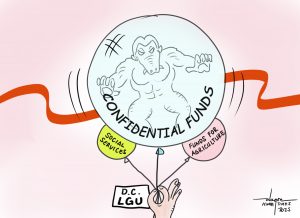During last week’s visit of United States Secretary of State Mike Pompeo in the Philippines he assured the government that “any armed attack on Philippine forces, aircraft or public vessels in the South China Sea will trigger mutual defense obligations.”
And by such statement the US official was referring to the commitment of America to come to the defense of the Philippines under the Mutual Defense Treaty (MDT) that was entered into by the two countries way back in the early 1950s.
In spite of this one important obligation however, President Rodrigo Duterte and his Defense Secretary Delfin Lorenzana are one in their doubts that owing to what they termed as “vagueness” in the way the treaty provisions were crafted, compliance by the US with its obligation relative to the defense of the Philippines may not come when it is critically needed.
From where we are perched we view the two Philippine officials’ apprehension on the US’ immediate response as the outcome of their interpretation of the treaty provisions. More so with their knowledge that the MDT was not ratified by the US Congress until today. Thus, they (the President and the Defense chief) are calling for a review of the MDT.
On the other hand Philippine Foreign Affairs Secretary Teodoro Locsin Jr., while agreeing to the observation of “vagueness” of the MDT in general, shared with Pompeo his position that “In vagueness lies uncertainty. Specificity invites evasion and actions outside the MDT framework.”
But Locsin also admitted that “too much vagueness lends itself to doubt the firmness of commitments.”
Taken in the context of the President and Lorenzana’s apprehension, it is clear that Locsin also believes that the US could capitalize on the MDT “vagueness” to not immediately respond when the Philippines seeks to have the former comply with its commitment of coming to the defense of the country when it is most needed.
And we have this statement that Locsin himself quoted US President Donald Trump and State Secretary Pompeo as telling President Duterte, “We have your back.”
Does this statement require highly intellectual thinking to understand? From the ordinary man on the road the statement could be taken to mean that, we Filipinos, have to go to the front line first and engage the invaders. The Americans will be at our back observing the progress of the fighting.
So, the likelihood is that since the Americans “have our back” they may or may not embroil themselves in the fighting depending on whether a loss in the battle that we Filipinos engage in, will adversely affect the US interests in the region or in their homeland.
What difference would have been made had the statement made by Trump and Pompeo to President Duterte as quoted by Locsin if it were, “We will be fighting side by side with you in case of any attack.” But no, it is “We have your back.”
Besides, we are of the opinion that China need not go to war against the Philippines to bring the country on its knees. And assuming that reports are true the giant nation is building up military installations in firing distance to the Philippines it is still very unlikely intended against our nation. Studies will tell anyone who is interested to know that China has no history of having colonized any country in Asia and elsewhere. What that country is known for is the extension of economic activities by its people in almost every continent of the world. Yes, that country has its Chinatowns even in the United States’ major cities as it has in almost every developed towns and cities in the Philippines. Hence, if at all China will make our country its shooting target, it has probably gone to war against the US.
But we know that neither the US nor China would be willing to go to war against each other. No two nations will ever destroy the billions of dollars worth of economic partnership they have built over the years. What could possibly bring them to a head is when one gets over the other in the most disadvantageous manner.
For now though, we feel that it is the US that is adopting the discriminatory economic policy; its strong call to allied nations not to use the technology of Chinese telecommunications giant Huawei. Citing allegations that Huawei is not transparent; that it is used in spying activities, the US warns countries including the Philippines of the risks that the Chinese-developed technology could bring to the country’s relatively behind communications systems.
This seemingly anti-competition policy of the US, to us, could well be the real trigger. And the Philippines could just end up as collateral damage. The Japanese invasion of the country during the second World War was just about eight decades past not to be remembered.


